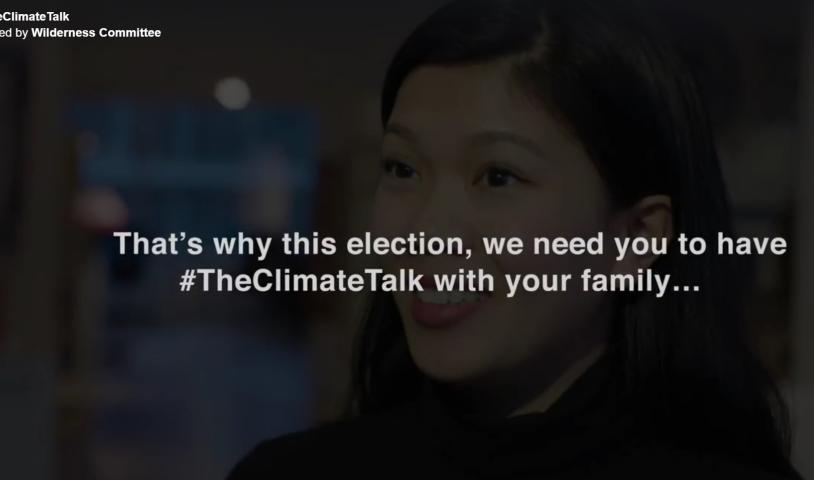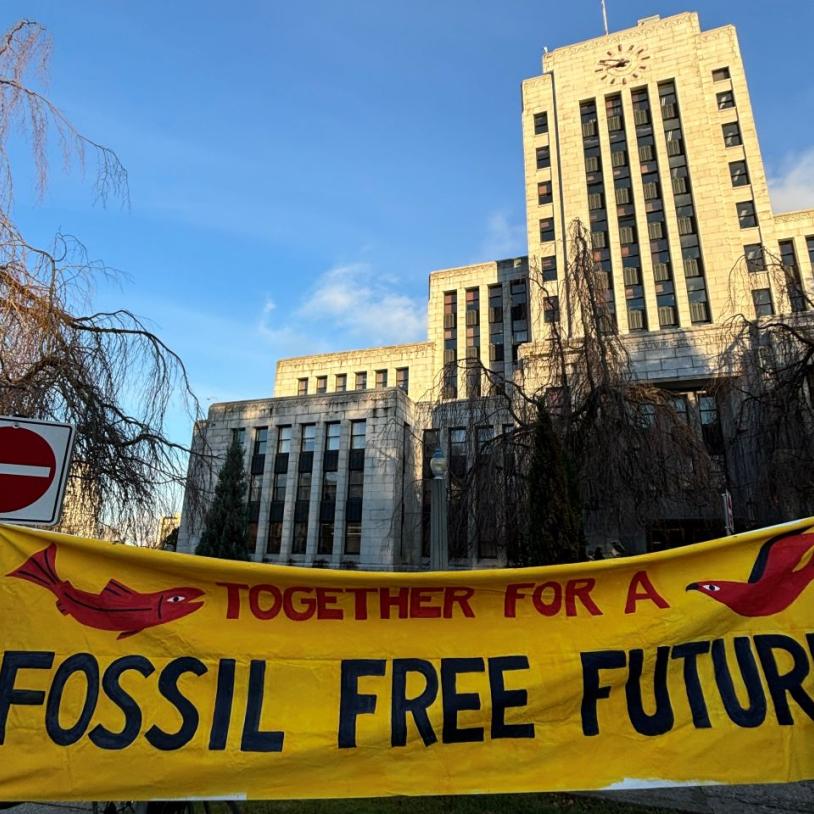Ready to have #TheClimateTalk? Here are some tips!
Monday, April 10, 2017
Help make climate change a top priority this election! Young people all across British Columbia are sitting down with their families to have an honest conversation about their future in a warming world.
So you’ve seen the video and now you’re excited to have your talk – that’s great! Maybe you could use a little advice to jog the discussion with your folks.* Read over these helpful tips and questions to get your mind rolling.
To start your talk, we suggest bringing up some of the climate changes we’re witnessing in BC already!
-
Much of British Columbia experienced a much colder winter than normal this year. On the south coast, we dealt with more snow than ever in recent memory. It turns out this may be linked to unprecedented high temperatures in the Arctic.
-
While this spring has been off to a cool start, around this time last year we were already seeing wildfires spark evacuations in BC’s north and temperatures in Metro Vancouver over 25 degrees.
How does it feel, as a young person looking to your future, to know the world will continue warming?
-
Set the stage for a serious conversation by telling your folks how climate change is already on your mind. Do you worry about having to deal with the consequences of global warming? How does thinking about this future make you feel?
-
Some researchers have already coined the term “pre-traumatic stress disorder” for climate-related anxiety. It’s perfectly normal – and expected – to be distressed about this issue. Letting a parent know that it is troubling you, and asking them to take action to help, is a great solution.
From there it’s a pretty easy transition to the “new normal” that you will experience in your lifetime.
-
How old will you be in 2050? Probably around your parents’ age. By then, the world will have reached what scientists call “climate departure” – when the average day will be warmer than even the hottest temperatures we’ve seen in the past.
-
In other words, this is when the Earth (and you if you’re still here!) will experience an entirely new climate, warmer than any we’ve seen in human history.
Of course that’s a little abstract… let’s discuss what that looks like here in British Columbia.
-
A report out this year from Metro Vancouver says the region will have the climate of San Diego by the middle of the century. Imagine BC’s mighty forests being replaced with the semi-arid sagebrush of southern California, and all we would lose in the process. Hundreds of thousands of forestry and tourism jobs would be lost. Wildfires would cause health impacts from respiratory issues to PTSD to loss of life. Traditional foods for Indigenous peoples would disappear.
-
Meanwhile, refugees will be arriving from places where extreme weather has forced people from their homes. Most sources cite a figure that 200 million people will be displaced by 2050 due to climate change, although estimates are unreliable and vary from 25 million to one billion.
What are your plans for the future? Do you plan to have kids and/or buy a house?
-
Many parents expect their children to follow a similar path that they have in life. But for young people, climate change looms over our hopes for the future. Whatever your plans, how does the fact that the world will likely be a more dangerous place factor into those decisions?
-
You don’t need to have thought hard about these issues to explain the link to your parents. Making it clear that climate change will impact the life you envision will be enough to let them know the gravity of the situation.
What sort of career are you interested in pursuing?
-
Think about the job you see yourself in for the future and any potential connections to climate change. It won’t be applicable for all careers, but any work that relies on the natural environment will be impacted and those in the public sphere will be tasked to find solutions.
-
No matter what career you want, you can discuss the type of jobs you want to see available. Do you want to work in an industry that is causing climate change or one that’s part of the solution? Often the jobs argument is used as an excuse to delay action to reduce carbon pollution – but the careers that thrive in a low-carbon economy are clearly the ones with a future.
What direction do you think BC is heading on this issue?
-
British Columbia will miss its 2020 targets to cut carbon pollution due to years of inaction. At the same time, if plans to dramatically increase U.S. thermal coal, tar sands oil and liquefied natural gas exports move forward, we lock ourselves into decades of making the problem worse.
-
What do you need to see from our leaders to tackle this issue? What do you currently see?
MAKE SURE AT THE END OF YOUR DISCUSSION TO ASK YOUR PARENTS TO MAKE CLIMATE CHANGE THEIR TOP PRIORITY IN THE PROVINCIAL ELECTION ON MAY 9.
IF your parent shares doubts about the science of climate change…
-
Over 1,500 leading scientific researchers contribute to the Intergovernmental Panel on Climate Change which says with 95 per cent certainty that humanity is causing the majority of global warming. This is a similar level of scientific consensus as the link between smoking and cancer.
-
Don’t debate the science with them as it will derail the topic. Tell your parent you accept the troubling reality of climate change and you need them to get on board, or at least hear you out.
IF your parent tries to diminish or downplay your concerns…
-
Remind them that the world has acknowledged this crisis since at least 1988 and has done very little over the last 30 years to deal with it. We are out of time.
*We recognize many young people don’t have parents to reach out to about this issue so to make this initiative as inclusive as possible, reach out to a guardian, close friend or mentor, or anyone who cares!





